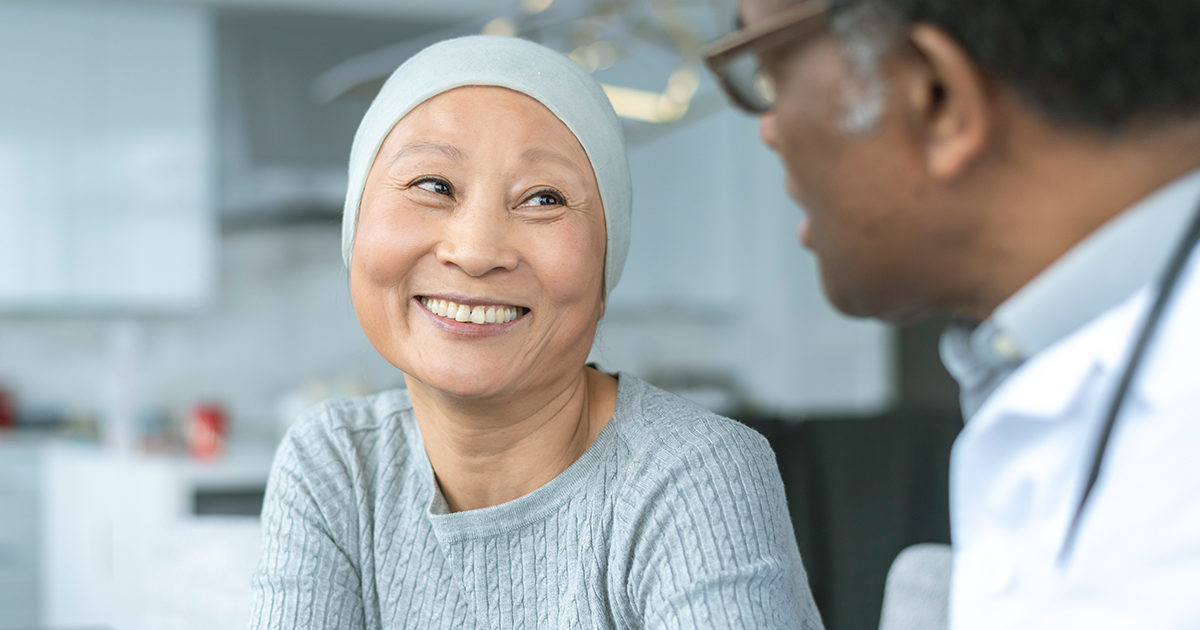About Gallbladder Cancer
The gallbladder concentrates and stores bile, a fluid made in the liver. Bile helps digest the fats in foods as they pass through the small intestine. While the gallbladder helps digest food, you don’t need your gallbladder to live. Many people have their gallbladders removed and go on to live normal lives. Gallbladder cancers are rare and nearly all of them are adenocarcinomas, which means the cancer starts in gland-like cells that line many surfaces of the body, including the inside of the digestive system.
Gallbladder cancer can be challenging to detect and diagnose at an early stage, making treatment more difficult. Since gallbladder cancer is uncommon, accounting for only 1.2 percent of all cancer diagnoses in the United States, it is best managed by gastrointestinal cancer specialists with a focus on these tumors.
Types of Gallbladder Cancer
Gallbladder cancer is classified according to the type of cells that are involved. More than 85% of gallbladder cancers are adenocarcinomas, which start in the gland cells(the cells that produce mucus)in the gallbladder lining.
There are three types of adenocarcinoma of the gallbladder:
- Nonpapillary adenocarcinoma: Cancer originating in the gland cells in the gallbladder lining; this is the most common type of the three
- Papillary adenocarcinoma: Cancer originating in the connective tissues that hold the gallbladder in place; this type is rare and less likely to spread to the liver or nearby lymph nodes
- Mucinous adenocarcinoma: Cancer originating in the cells that produce mucin, the primary ingredient of mucus; this type is the rarest of the three
Other types of gallbladder cancers that arise from different types of cells in the gallbladder include adenosquamous carcinoma, squamous cell carcinoma, and carcinosarcoma, but these are quite rare.
Symptoms of Gallbladder Cancer
Early gallbladder cancer can often cause no signs or symptoms.
Symotims of gallbladder cancer may include:
- Bloating
- Fever
- Jaundice (yellowing of the skin and whites of the eyes)
- Lumps in the abdomen
- Nausea and vomiting
- Pain above the stomach
Risk Factors for Gallbladder Cancer
Certain people are at greater risk of developing gallbladder cancer.
Risk factors for gallbladder cancer may include:
- Age: Gallbladder cancer can occur at any age, though it typically affects those over the age of 60.
- Comorbid conditions: Abnormalities of the bile ducts and choledochal cysts, bile-filled sacs along the common bile duct, are linked to the condition.
- Family history: A family history of gallbladder cancer can increase your risk for the condition. Additionally, Native Americans, Mexican Americans, and Latin Americans are at higher risk for developing gallbladder cancer than other groups.
- Health history: Gallbladder cancer is associated with a history of the following:
- Galbladder polyps
- Gallstones
- Porcelain gallbladder, a condition where the wall of the gallbladder becomes covered with calcium deposits
- Primary sclerosing cholangitis (PSC), a condition in which inflammation of the bile ducts (cholangitis) leads to the formation of scar tissue (sclerosis)
- Typhoid infection
- Personal history: Smoking, obesity, and exposure to nitrosamines or to chemicals used in the rubber and textile industries are all linked to gallbladder cancer.
- Sex: Women are 3-4 times more likely to be diagnosed with gallbladder cancer than men.
Treating Gallbladder Cancer at UT Health Austin
Treatment requires accurate diagnosis and a care plan tailored to the specific type of tumor, the tumor’s location, and the overall needs of the patient. The different behavior of different tumor types helps drive decisions about treatment, which may include combinations of surgery, radiation therapy, and chemotherapy.
Care Team Approach
At UT Health Austin, we take a multidisciplinary approach to your care. This means you will benefit from the expertise of multiple specialists across a variety of disciplines. Your care team will include surgical oncologists, physical therapists, dietitians, social workers, and more who work together to help you get back to the things in your life that matter most to you.
We also collaborate with our colleagues at the Dell Medical School and The University of Texas at Austin to utilize the latest research, diagnostic, and treatment techniques, allowing us to identify and utilize new therapies to improve cancer treatment. We are committed to communicating and coordinating your care with your other healthcare providers to ensure that we are providing you with comprehensive, whole-person care.
Learn More About Your Care Team

Surgical Oncology
Health Transformation Building, 8th Floor
1601 Trinity Street, Bldg. A, Austin, TX 78712
1-833-UT-CARES (1-833-882-2737)
Get Directions